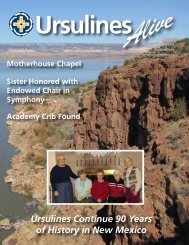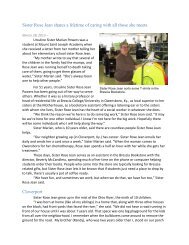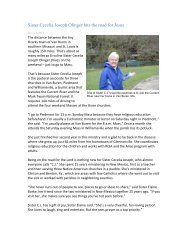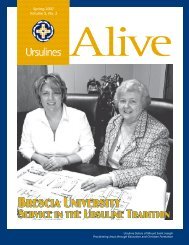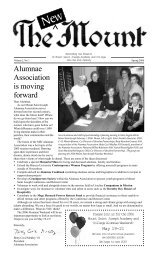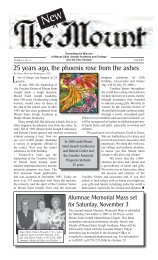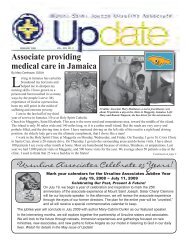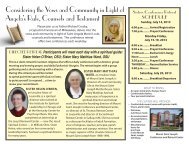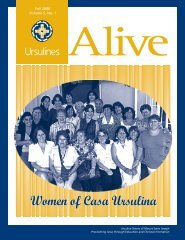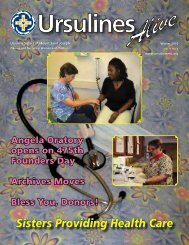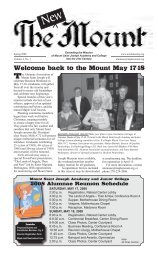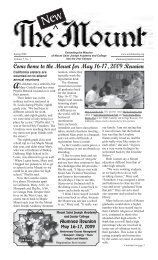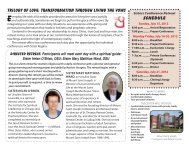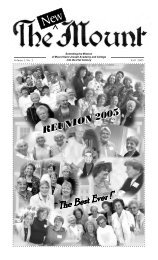Sisters and staff attend poverty immersions in Louisville and Memphis
Sisters and staff attend poverty immersions in Louisville and Memphis
Sisters and staff attend poverty immersions in Louisville and Memphis
You also want an ePaper? Increase the reach of your titles
YUMPU automatically turns print PDFs into web optimized ePapers that Google loves.
P<br />
overty <strong>immersions</strong> raise awareness<br />
of great needs<br />
By Jennifer Kam<strong>in</strong>ski, Mount Sa<strong>in</strong>t Joseph Staff<br />
What do those liv<strong>in</strong>g <strong>in</strong> <strong>poverty</strong> consider to be their<br />
possessions? The answer is…people. Unlike the middle<br />
class whose possessions are “th<strong>in</strong>gs” or the wealthy who value<br />
one-of-a-k<strong>in</strong>d objects,* the vantage po<strong>in</strong>t of the person <strong>in</strong><br />
<strong>poverty</strong> strips away all of the nonessentials. It says someth<strong>in</strong>g<br />
to all of us about sett<strong>in</strong>g priorities.<br />
“The poor welcome people they like <strong>in</strong>to their social circles.<br />
And they have such a tenacious love for their mothers,” said<br />
Ursul<strong>in</strong>e associate Judy Gray, who, along with Sister Maureen<br />
Gr<strong>in</strong>er, directed a <strong>poverty</strong> immersion experience Aug. 17-18 at<br />
Mount Sa<strong>in</strong>t Joseph.<br />
I <strong>attend</strong>ed this virtual immersion <strong>and</strong> a <strong>poverty</strong> immersion<br />
<strong>in</strong> <strong>Louisville</strong>, Ky., a week later. See<strong>in</strong>g people <strong>in</strong> <strong>poverty</strong> can<br />
burden one’s heart with the thought of liv<strong>in</strong>g such difficult<br />
lives. It can be<br />
People who are much too<br />
sensitive to dem<strong>and</strong> of<br />
cripples that they run races<br />
ask of the poor that they<br />
get up <strong>and</strong> act just like<br />
everyone else <strong>in</strong> society.<br />
~Michael Harr<strong>in</strong>gton,<br />
American activist <strong>and</strong> writer<br />
* Taken from a chart titled, Hidden Rules Among<br />
Classes, <strong>in</strong> “A Framework for Underst<strong>and</strong><strong>in</strong>g<br />
Poverty,” by Ruby K. Payne, Ph.D.<br />
humbl<strong>in</strong>g when<br />
you consider that<br />
you could be just a<br />
calamity away from<br />
walk<strong>in</strong>g <strong>in</strong> their shoes.<br />
It’s also uplift<strong>in</strong>g<br />
when you see their<br />
grateful acceptance<br />
of assistance, whether<br />
it’s a meal at the<br />
soup kitchen, or a seat <strong>in</strong> an air-conditioned build<strong>in</strong>g on a hot<br />
summer day, or an iron bunk bed at the shelter at night.<br />
In order to better address the <strong>poverty</strong> of body, m<strong>in</strong>d <strong>and</strong><br />
spirit <strong>in</strong> the communities they serve, the Ursul<strong>in</strong>e <strong>Sisters</strong> of<br />
Mount Sa<strong>in</strong>t Joseph planned <strong>poverty</strong> immersion experiences for<br />
sisters, associates <strong>and</strong> employees <strong>in</strong> August.<br />
“An immersion experience is a powerful way to confront a<br />
critical issue,” said Congregational Leader Sister Michele Morek.<br />
“Through h<strong>and</strong>s-on <strong>and</strong> face-to-face exposure to the sights <strong>and</strong><br />
sounds of suffer<strong>in</strong>g <strong>and</strong> alienation, we can see clearly how we are<br />
part of the problem <strong>and</strong> the solution.”<br />
Judy called <strong>poverty</strong> a national disaster that seems to be an<br />
accepted part of American society. “It is all around us. It can be<br />
overwhelm<strong>in</strong>g,” she said. “But we can br<strong>in</strong>g light <strong>in</strong>to difficult<br />
situations. The bottom l<strong>in</strong>e is that we need to see Jesus <strong>in</strong> the<br />
face of the homeless.”<br />
Thirty-seven million Americans, or 12.7 percent of the<br />
population, live <strong>in</strong> <strong>poverty</strong>. Poverty can<br />
be caused by hard times (situational<br />
Sister<br />
Maureen<br />
Gr<strong>in</strong>er, right,<br />
leads the<br />
discussion at<br />
the virtual<br />
<strong>poverty</strong><br />
immersion at<br />
Maple Mount.<br />
Twenty-four<br />
<strong>attend</strong>ed the<br />
workshop.<br />
Poverty is like punishment for<br />
a crime you didn’t commit.<br />
~Eli Khamarov, Lives of the Cognoscenti<br />
F a l l 2 0 0 7<br />
Sister Clarita Brown<strong>in</strong>g<br />
<strong>and</strong> Sister Mary Irene<br />
Cecil look at a map<br />
of the United States<br />
at a virtual <strong>poverty</strong><br />
immersion Aug. 17 at<br />
Mount Sa<strong>in</strong>t Joseph.<br />
The population of<br />
the states <strong>in</strong> yellow is<br />
equal to the number of<br />
Americans who live <strong>in</strong><br />
<strong>poverty</strong>: 37 million.<br />
life changes), or it may follow a generational pattern. The<br />
latter is characterized by a lack of education <strong>and</strong> skills <strong>and</strong> a<br />
“desperation” which can lead to substance abuse, violence <strong>and</strong><br />
crime.<br />
“They can have layers <strong>and</strong> layers of problems,” Sister<br />
Maureen said.<br />
There is a misconception that the poor are not work<strong>in</strong>g hard<br />
enough. “The work<strong>in</strong>g poor struggle to hold down two or three<br />
jobs,” Judy said. “A lot of people are liv<strong>in</strong>g on the edge.”<br />
The press<strong>in</strong>g needs of the poor are the basics: food, cloth<strong>in</strong>g<br />
<strong>and</strong> shelter. At meals, the poor ask, “Did you have enough?”<br />
while the middle class ask, “Was it good?” <strong>and</strong> the wealthy are<br />
more concerned with its presentation.*<br />
Dur<strong>in</strong>g the Maple Mount immersion, 19 sisters, three<br />
associates <strong>and</strong> two employees learned about <strong>poverty</strong> statistics <strong>and</strong><br />
watched a movie, “God Bless the Child,” a realistic portrayal of a<br />
s<strong>in</strong>gle mother (Mare W<strong>in</strong>n<strong>in</strong>gham) struggl<strong>in</strong>g to survive.<br />
“There’s a level of exhaustion associated with <strong>poverty</strong>,” Sister<br />
Maureen said. S<strong>in</strong>gle women <strong>and</strong> children are hit particularly<br />
hard by <strong>poverty</strong>, with 85 percent of homeless families headed by<br />
females. Children under the age of six are at greater risk. In fact,<br />
the <strong>poverty</strong> rate is higher among children than the elderly.<br />
Can a head of household work<strong>in</strong>g full-time earn<strong>in</strong>g<br />
m<strong>in</strong>imum wage move out of <strong>poverty</strong>? The short answer is no.<br />
Even if the family can afford shelter, utilities, transportation,<br />
food, health care, medic<strong>in</strong>e, <strong>and</strong> child care, the <strong>in</strong>come doesn’t<br />
cover “extras” such as cloth<strong>in</strong>g, toiletries,<br />
<strong>and</strong> furniture.<br />
To illustrate the wide chasm between<br />
the poor <strong>and</strong> the wealthy, Sister Maureen<br />
Cont<strong>in</strong>ued on page 4<br />
3



